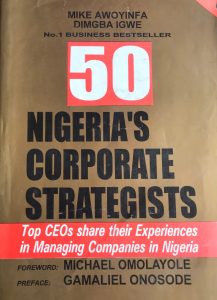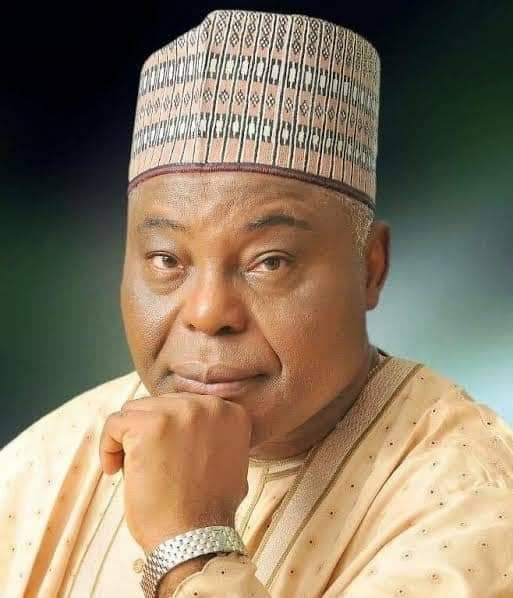It is sad to hear that one of the giants featured in our bestselling book, 50 NIGERIA’S CORPORATE STRATEGISTS—Top CEOs Share Their Experiences in Managing Companies in Nigeria is no more. How else do I remember Dr. Raymond Dokpesi—the first to blaze the trail of a privately owned radio station in Nigeria—than to celebrate him in this column? Here is Dokpesi telling the story of Ray Power, from the management book by Mike Awoyinfa and Dimgba Igwe published in 1999:
 There is no secret about the coming and instant acceptance and success of Ray Power outside the managerial qualities of hard work, courage, adventurism and intuitive vision. During the days of my political campaigns, I undertook a tour of 589 local government areas of Nigeria. In the course of that tour, I discovered a lot about the manipulation by the elite that come from the cities to disseminate information in a way that misled the people. I also discovered a crucial gap in our information dissemination strategy: people are not entertained, enlightened and educated on many things relevant to their lives. And the people needed the means of mass communication to achieve that.
There is no secret about the coming and instant acceptance and success of Ray Power outside the managerial qualities of hard work, courage, adventurism and intuitive vision. During the days of my political campaigns, I undertook a tour of 589 local government areas of Nigeria. In the course of that tour, I discovered a lot about the manipulation by the elite that come from the cities to disseminate information in a way that misled the people. I also discovered a crucial gap in our information dissemination strategy: people are not entertained, enlightened and educated on many things relevant to their lives. And the people needed the means of mass communication to achieve that.
Frankly, I was lost. I didn’t even know what to do until my brother-in-law, Mr. Kenny Ogungbe who just came back from the US and was with me during the campaigns, told me that in the US, you have private stations. I said, “To the best of my knowledge, radio stations are owned exclusively by governments.” But that set me thinking. I also knew that some elite have private satellite transmission. Which means that there were some special dispensations that allowed the satellite companies to operate. Information or knowledge is power because when you are limited in your scope of information knowledge, you also limit the scope of business possibilities available to you. I decided to find out what the Constitution says about private electronic media stations. If you want to achieve things in life, you must always try to explore the frontiers of the status quo to see areas you could take advantage of. To my surprise, I discovered that the 1979 Constitution did not actually say that it was NOT possible to have private electronic stations. All it said was that it was at the discretion of the president. Luckily for me, while this research was going on, I met the minister of information, Professor Sam Oyevbare at the airport. We were just chatting. I said, “Look, Prof, I was coming to see you.”
“Over what?” he asked.
“I have just toured the whole of Nigeria and I have come to the conclusion that I am very interested in this private radio station or television station.”
And he laughed, saying: “The head of state has just passed an instruction to that effect. But we are waiting for the enabling decree.”
“Very good, but what is the next step? What should I do?”
He said, “But please note that no political party or religious body is allowed to own an electronic media.”
“Well, I am not a political party. I am Raymond Dokpesi.”
“Fine. Let the committee that is working on it come up with something and you will get to hear.”
On August 24, 1992, the decree was published. I went back to them at the Ministry of Information and they asked me to put forward an application. I did and I got an approval in principle. That kept me on. But I was still involved in my political campaigns. The political efforts were still on. With politics on, I was not able to concentrate fully. I still went through the whole hog of attempting to win my party’s nomination as presidential candidate in 1992. But immediately the elections were cancelled, it became obvious that I had to go back to business. I promised myself that if this was what I was going to contribute to Nigerians, I had to do it. After the political process, I travelled to the US with Kenny Ogungbe. I had the opportunity to visit Stevie Wonder’s radio station KJLH 102.3 FM in Los Angeles. When I saw it, I was surprised. “You mean this is what is radiating so much joy to a lot of people? Just a small thing like this? Yet it has such a good quality output.” I got the price tag and decided to check out a few more. The more I saw, the more I got excited, the more I got interested and the more I got committed to the fact that it must be done. After visiting about half a dozen places, I phoned my wife and asked her to transfer some money to me. I made up my mind there to buy the equipment.
“What!” she screamed, considering the amount involved. “Are you mad? How could you have done this? What do you want to buy…?” So many questions.
“Look, Madam, I need money. I NEED MOOOONEY!”
“Okay, why don’t you come back to Nigeria and let us discuss it first? I am sure we will see how best to go about it.”
I said, “Look, I am here. I am committed to concluding this thing. I don’t want anybody to start convincing me or trying to change my mind when I get back.”
Business is based on calculated risk, but sometimes, you act on instinct. My wife sent the money. When I got the equipment, I came back to Lagos on October 27, 1993. At that time, the present location of the station was a forest. I bought the land in anticipation of industrial development someday. The equipment was supposed to arrive December 15. Within six weeks. No studio. Nothing. We decided to build a place in six weeks. We worked here 24 hours. Nonstop. We were able to put up a structure just on time before the equipment arrived. The Americans were here to install it and we had our first transmission on December 30, 1993.
After the test transmission, the National Broadcasting Corporation said that we only had approval in principle, not a broadcasting licence. The “approval in principle” only allowed you to make arrangements, not to operate. Actually, the NBC had recommended us for licence along with others to the head of state. Our licence should have been signed into law by the then president, Ibrahim Babangida when he approved licences for private television stations, but this was not done because the government complained that the geographical spread of those recommendations was inadequate. The NBC resubmitted the recommendations several times over. On August 16, I received the letter from the NBC—the licence!
We have endeavoured to bring people to the radio and radio to the people; government to the people and people to the government—a forum for information democratization.
Share your story or advertise with us: Whatsapp: +2347068606071 Email: info@newspotng.com












